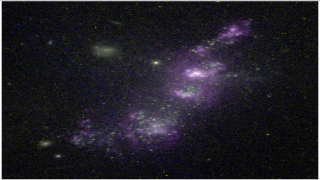Bibcode
Ramos Almeida, Cristina; Rodríguez Espinosa, Jose Miguel; Barro, Guillermo; Gallego, Jesús; Pérez-González, Pablo G.
Referencia bibliográfica
37th COSPAR Scientific Assembly. Held 13-20 July 2008, in Montréal, Canada., p.2556
Fecha de publicación:
0
2008
Número de citas
0
Número de citas referidas
0
Descripción
We have employed a reliable technique of classification of AGN based on
the fit of their spectral energy distributions with a complete set of
AGN types and starburst galaxy templates. We apply this method to a
sample of 116 AGN selected for their X-ray and mid-infrared emissions in
the extended Groth strip (96 with single detections and 20 with double
optical counterparts). With this technique, we are able to obtain
photometric redshifts and to distinguish between pure and host-dominated
AGN. For the objects with unique detection we find that they can be
separated into five main groups, namely: Pure Starbursts (24% of the
sample), AGN contaminated by Starbursts (7%), Type-1 AGN (21%), Type-2
AGN (24%), and Ellipticals & Spirals (24%). We find these groups
concentrated at different redshifts: Type-2 AGN and Ellipticals &
Spirals sources are concentrated at low redshifts, whereas Pure
Starbursts and Type-1 AGN show a larger span. Correlations between
hard/soft X-ray and ultraviolet, optical and infrared luminosities,
respectively, are reported, showing a noticeable improvement when only
Type-1 AGN are considered. The correlations get worse when the soft
X-ray luminosities are used instead of the hard X-rays. Type-1 AGN show
the highest values of hard and soft X-ray luminosities of the sample,
together with the AGN contaminated by Starbursts, whilst most of the
Ellipticals & Spirals show the lowest values, in agreement with the
typical hard X-ray luminosities of the local population of cool ULIRGs.
Pure Starbursts and Type-2 AGN present intermediate values of X-ray
emission, very similar to those of warm ULIRGs. For the 20 objects with
double detections the percentage of Pure Starbursts increases up to 48%.
SUBMITTED TO ApJ.
Proyectos relacionados

Grupo de Estudios de Formación Estelar GEFE
El proyecto interno GEFE está enmarcado en el proyecto coordinado, ESTALLIDOS, financiado por el plan nacional desde el año 2001. El ultimo proyecto aprobado es ESTALLIDOS 6.0 (AYA2016- 79724-C4-2-P). En el proyecto GEFE trabajamos en base al caso científico del proyecto ESTALLIDOS 6.0. Los estallidos de formación estelar (Starbursts o SB) son
Casiana
Muñoz Tuñón

Grupo de Estudios de Formación Estelar GEFE
El proyecto interno GEFE está enmarcado en el proyecto coordinado, ESTALLIDOS, financiado por el plan nacional desde el año 2001. El ultimo proyecto aprobado es ESTALLIDOS 6.0 (AYA2016- 79724-C4-2-P). En el proyecto GEFE trabajamos en base al caso científico del proyecto ESTALLIDOS 6.0. Los estallidos de formación estelar (Starbursts o SB) son
Casiana
Muñoz Tuñón